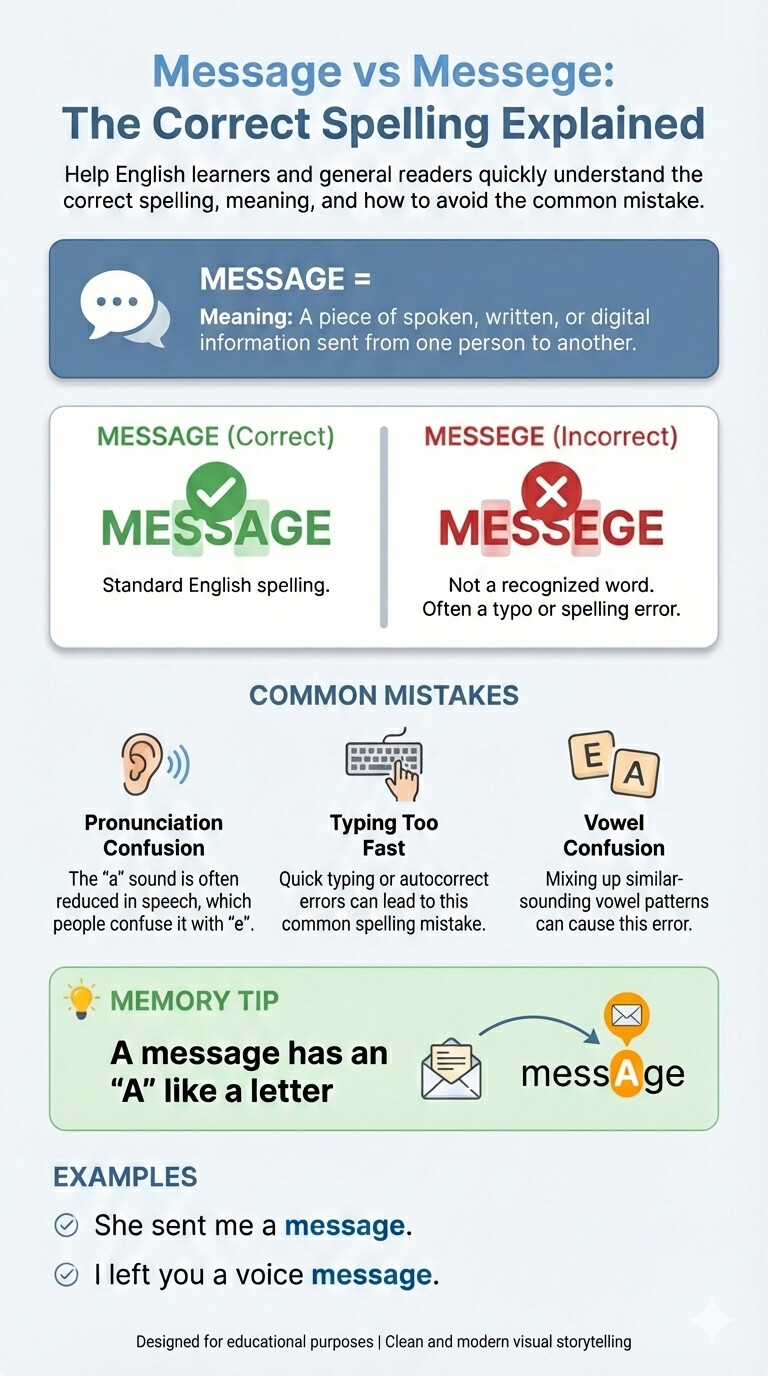If you’ve ever typed “messege” and wondered whether it’s correct, you’re not alone. This is one of the most common spelling mistakes in English, especially for learners and even native speakers who write quickly in messages, emails, or social media.
In this guide, you’ll learn the correct spelling, real meaning, common causes of the mistake, and practical tips to never get it wrong again.

What Does “Message” Mean?
Message is the correct spelling.
Definition
A message is a piece of information sent from one person to another. It can be spoken, written, or digital.
Examples
- I left you a message on WhatsApp.
- The teacher sent an important message to the students.
- Did you get my voice message?
Common Uses
- Text message
- Voice message
- Email message
- Error message
- Secret message
You might also enjoy: Breathe Vs Breath: Correct Spelling + 2025 Examples
Is “Messege” a Real Word?
No. “Messege” is incorrect and does not exist in standard English dictionaries.
It is simply a misspelling of “message” and often happens because:
- People write the word as it sounds
- Typing too fast on phones or keyboards
- English learners confuse vowel placement
Why Do People Confuse “Message” and “Messege”?
1. Pronunciation
“Message” is often pronounced as mes-ij. People assume it should be spelled messege instead of message.
2. Vowel Confusion
The “a” in message doesn’t sound strong, which makes people replace it with “e.”
3. Autocorrect Dependence
Some users rely on autocorrect instead of learning the correct spelling.
You might also enjoy: Acception vs. Exception: Difference + Examples + Spelling
Quick Comparison Table
| Word | Correct | Meaning | Example Sentence |
| Message | Yes | A piece of information sent | She sent me a message. |
| Messege | No | Not a real English word | She sent me a messege. |
How to Remember the Correct Spelling
Think: “A message has an ‘A’ like a letter.”
Another trick:
MESS + AGE = MESSAGE
Common Phrases Using “Message”
- Leave a message
- Send a message
- Get the message
- Voice message
- Text message
- Error message
You might also enjoy: That vs Which | Correct Usage + 2025 Examples
Professional Writing Tip
In professional emails, websites, and customer support systems, spelling mistakes like “messege” can reduce trust and credibility. Even small errors can make users question professionalism, especially in contact forms and automated replies.
Final Thoughts
The correct spelling is MESSAGE. “Messege” is a common mistake, but now you know why it happens and how to avoid it.
Key Takeaways
- Message = correct
- Messege = incorrect
- A message has an “A” like a letter

Hi, welcome to my blog! My name is Omid and I am thrilled to have you here! I am an English language teacher with 12 years of experience and hold multiple international certifications (TESOL, IELTS, TOEFL, PTE, CELTA). Additionally, I hold a PhD in Applied Linguistics with a specialization in Teaching English as a Second Language (TESL), which fuels my passion for teaching English and assisting others in mastering the language. To me, nothing is more rewarding than helping individuals enhance their English language abilities through various methods. So, let’s embark on this journey of learning English together.




